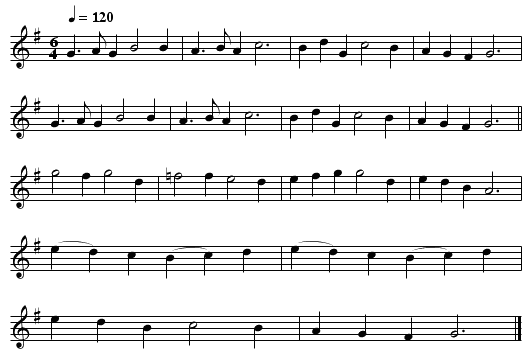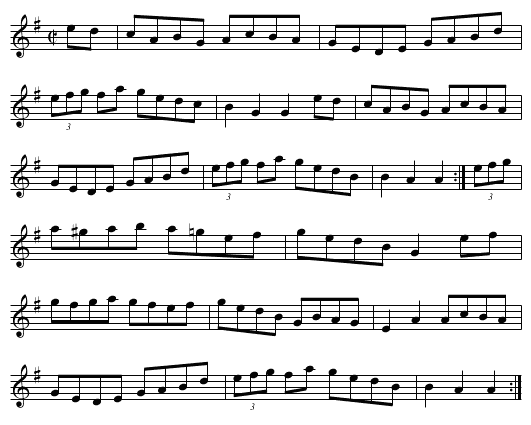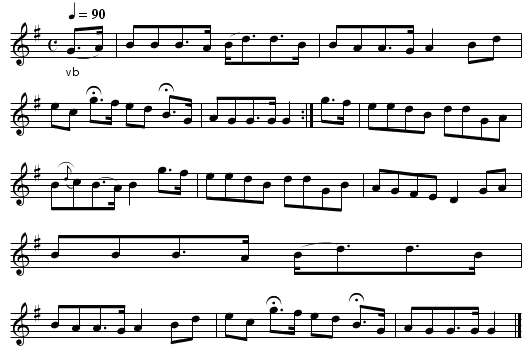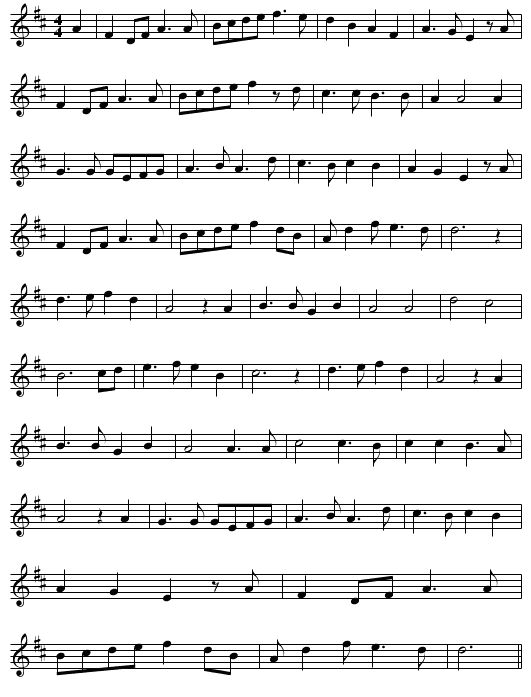

Songs That Made History: 'Lilli-Burlero' is the one song which is mentioned in every history book. It dates from 1687. During the Commonwealth, the native Irish were very harshly treated. Irish landowners and their dependents were driven west into the province of Connacht, their places being taken by English and Scottish settlers, of course Protestants. The practice of the Roman Catholic religion was forbidden by law. The extreme severity of these measures was relaxed under Charles II. But it was not until James II, himself a Roman Catholic, came to the throne, that the Irish began to hope for much better times. Topical songs sprang up and were sung in the streets. It is said that one of these, which became very popular, had for a refrain the Irish words: Lere, lere, burlere. Lere meant 'religion' or 'faith,' and burlere, 'your faith.' If this is the right explanation, the song may have meant much the same as the modern hymn, Faith of our Fathers.
In 1686 Richard Talbot, Earl of Tyrconnel, was promoted from being lieutenant-general to the post of lord-lieutenant, or king's deputy in Ireland. Talbot, in the subordinate position, had shown himself to be a zealous Roman Catholic. It was clear that the Protestant settlers would have an uncomfortable time, and sympathy for them sprang up in England and Scotland.
Such was the historical background against which Thomas, first Marquis of Wharton, wrote his famous verses. The words are put into the mouth of an imaginery Irishman rejoicing with a friend over the new appointment. The refrain 'Lilli-burlero bullen-a-la' is nonsense, but 'Lilli-burlero' was adopted as a deliberate corruption of the words of the Irish song quoted above. Wharton fitted his words to, or probably wrote them to fit, an attractive, agile little tune, possibly Irish in origin, and already popular. It is commonly stated that the tune was composed by Henry Purcell. But a form of it had been printed in 1661–when Purcell was only three. This was in a collection called An Antidote against Melancholy, and it is set to words of which the first line runs:
There was an old man of Waltham Cross.
Purcell 'arranged' the tune for Wharton in the sense in which Arne had arranged the tune to God save the King.[51] He improved the melodic line and fitted it with harmonies.

|
Lilli-Burlero
Ho! broder Teague, dost hear de decree,
Lilli-burlero, bullen-a-la,
Dat we shall have a new deputee?
Lilli-burlero, bullen-a-la.
Lero, lero, lilli-burlero, lilli-burlero, bullen-a-la,
Lero, lero, lilli-burlero, lilli-burlero, bullen-a-la.
For de good Talbot is made a lord,
Lilli-burlero, bullen-a-la,
And with brave lads is coming aboard.
Lilli-burlero, bullen-a-la.
Lero, lero, etc.
Arrah! but why does he stay behind?
Lilli-burlero, bullen-a-la,
Ho! by my soul 'tis a Protestant wind.
Lilli-burlero, bullen-a-la.
Lero, lero, etc.
But see, de Tyrconnell is now come ashore,
Lilli-burlero, bullen-a-la,
And we shall have commissions galore.
Lilli-burlero, bullen-a-la.
Lero, lero, etc.
Dare was an old prophecy found in a bog
Lilli-burlero, bullen-a-la,
'Ireland shall be ruled by an ass and a dog.'
Lilli-burlero, bullen-a-la.
Lero, lero, etc.
And now dis prophecy's come to pass,
Lilli-burlero, bullen-a-la,
For Talbot's de dog, and James is de ass.
Lilli-burlero, bullen-a-la.
Lero, lero, etc.
|
The provocative and topical words, allied to the lilting melody, gave to the song instant popularity. It spread quickly through England, Scotland, and Protestant Ireland. Burnet wrote about it: 'The whole army and at last all people in city and country were singing it perpetually. Perhaps never had so slight a thing so great an effect.' Bishop Percy, more ponderously wrote: 'These rhymes, slight and insignificant as they now seem, had once a more powerful effect than the philippics of Demosthenes and Cicero, and contributed not a little towards the revolution of 1688.' Wharton himself boasted that his song danced James II out of three kingdoms. The words for the most part explain themselves against their historical background. The word 'Teague' in the first line was a sobriquet applied to any Irishman; 'Paddy' is its modern equivalent. The phrase 'Protestant wind' in the third verse is interesting. After Talbot's appointment as deputy, he was delayed at Holyhead for several days in January 1687 by persistent strong winds from the west. This the Irish called a 'Protestant wind.' But in the following year, the phrase reversed its meaning. In October, William of Orange, the Protestant champion, was waiting on the Dutch coast to invade England. Again there were tempestuous winds from the west. In London this was called a Catholic wind as it prevented William from sailing and, at the same time, enabled Catholic troops to be transported from Ireland. Macauley describes the people in Cheapside gathering to gaze at the weathercock on the top of the spire of Bow Church and praying for a Protestant wind. The vane at the north end of Whitehall Palace (now the United Service Museum), erected by order of James so that he might be informed as to the religion of the wind during those critical weeks, is still in existence.
Many sets of words, on many topics, have been written to the tune of Lilli-burlero. Among them is a well-known 'Orange' song, The Protestant Boys. James II, after his flight to France in December 1688, sailed to Ireland, hoping to regain his kingdom from there. But William of Orange defeated him at the battles of the Boyne and of Aughrim in 1689. From now date the feuds between Orange and Green in Irish history which are reflected in Irish song. Lilli-burlero was for a long time a favourite whistling tune in the English army. Sterne makes Uncle Toby whistle it–appropriately enough, for he was at the Boyne as well as with the armies in Flanders. Its use as a quickstep in the British Army has been discontinued for the last seventy years: its association with the words of the 'Orange' song mentioned above was thought to make it offensive to Roman Catholics in Irish regiments.
All through the troubled history of Ireland songs have played their part in keeping alive memories of past heroisms and in stimulating discontent. Many songs are connected with the events of 1798 and the years immediately preceding.[4][4] The burning question was still, in part, a religious one, whether Roman Catholics should be allowed to sit in the Irish Parliament, or, at any rate, to vote. But the movement was national. The Presbyterians in Ulster were also disenfranchised. A society was formed called the United Irishmen, two of the prominent leaders of which were Grattan and Wolfe Tone, both Protestants. Just as it seemed likely that the desired reforms would become law, they were obstructed by the viceroy of the time. Agents from revolutionary France played their part in stirring up disaffection. So the United Irishmen became a rebel society. There were dreams of amn Irish Republic, and help was sought from France. In the winter of 1796 a French fleet carrying troops eluded the English Channel Fleet. But they ran into wild weather. Some of the ships anchored in Bantry Bay. But, finding they had lost touch with the rest of the fleet, they returned to France without achieving anything. This episode forms the subject of the song, The Shan Van Voght. The term means 'Poor old woman,' that is, Ireland.

|
The Shan Van Voght 'Oh! the French are on the sea,' says the Shan Van Voght, 'Oh! the French are on the sea,' says the Shan Van Voght, 'The French are in the Bay, they'll be here at break of day, And the Orange will decay,' says the Shan Van Voght, 'And the Orange will decay,' says the Shan Van Voght. 'And where will they have their camp?' says the Shan Van Voght, 'And where will they have their camp?' says the Shan Van Voght. 'On the Curragh of Kildare, and the boys will all be there With their pikes in good repair.' says the Shan Van Voght, 'With their pikes in good repair,' says the Shan Van Voght. 'And what will the yeomen do?' says the Shan Van Voght, 'And what will the yeomen do?' says the Shan Van Voght, 'What will the yeomen do but throw off the red and blue, And swear they will be true to the Shan Van Voght? And swear they will be true to the Shan Van Voght?' 'Then what colour will be seen?' says the Shan Van Voght, 'Then what colour will be seen?' says the Shan Van Voght, 'What colour should be seen where our fathers' homes have been But our own immortal green?' says the Shan Van Voght, 'But our own immortal green?' says the Shan Van Voght. 'Will old Ireland then be free?' says the Shan Van Voght, 'Will old Ireland then be free?' says the Shan Van Voght, 'Old Ireland shall be free from the centre to the sea; Then hurrah for liberty,' says the Shan Van Voght, 'Then hurrah for liberty,' says the Shan Van Voght. |
But the song of this period which has retained most popularity is The Wearin' o' the Green. The words of this refer to the prohibition by the English authorities in 1798 of the wearing of national emblems, especially the 'Green,' that is, the shamrock, the plant associated with St. Patrick. The tune was originally a marching song of the United Irishmen. Nowadays it is sung at a slower tempo, as seems fitting, considering the gentle melancholy of words and music. The words have been slightly rewritten, but in substance they are contemporary. Napper Tandy, referred to in the first verse, was the first secretary of the United Volunteers. He went to France as an agent from Ireland, and he was there at the time when these verses were written. He afterwards took part in one of the unsuccessful landings from a French ship. Captured by the British, and condemned to death, he was allowed to escape to France, where he died. The song was an especial favourite with Queen Victoria. Perhaps it is not too fanciful to connect this with the custom, instituted by her, and maintained by her successors, of sending shamrock for distribution to the Irish Guards on St. Patrick's Day, 17th March.

|
The Wearin' o' the Green Oh, Paddy dear! an' did ye hear the news that's goin' round? The Shamrock is forbid, by law to grow on Irish ground. Saint Patrick's Day no more we'll kape, his color can't be seen, For there's a cruel law agin the wearin' o' the Green. I met wid Napper Tandy and he tuk me by the hand, And he said 'How's poor ould Ireland, and how does she stand?' She's the most distressful counthery that iver yet was seen, For they're hangin' men and women there–for wearin' o' the green! Then since the color we must wear is England's cruel red, Sure, Ireland's sons will ne'er forget the blood that they have shed. You may pull the shamrock from your hat and cast it on the sod, But 'twill take root and flourish there, tho' under foot 'tis trod. When laws can stop the blades of grass from growin' as they grow, And when the leaves in summer-time their verdure dare not show, Then I will change the colour, too, I wear in my caubeen, But till that day, plaze God! I'll stick wearin' o' the green. |
The rebellion of 1798 collapsed. The French landed a small force, which was defeated at Castlebar. But there were many happenings in the struggle in which native Irish played a part; these are recorded in many songs. In particular there are several songs concerned with the siege of Wexford. These in turn became the rallying cries at the next time of discontent. Thus in 1848, at the time of the Young Ireland Party, they sang a song which started:
Who fears to speak of 'Ninety-eight? Who blushes at the name? When cowards mock the patriot's fate, Who hangs his head for shame?
So, too, the events which led up to Sinn Fein and the Irish Free State brought their crop of songs: Ireland Over All, Wrap the Green Flag round me, Boys, The Song of the Legion of the Rearguard, and Countess Markievicz's Battle Hymn. But by far the best of these was The Soldier's Song, which has become the national anthem of the Free State. It is a new song. That is, words and music were written by living Irishmen without drawing on any traditional material. The tune is inspiriting and lives up to the standard of freely flowing melodic line which the best Irish tunes have always possessed.

|
The Soldiers' Song
We'll sing a song, a soldier's song,
With cheering rousing chorus,
As round our blazing fires we throng,
The starry heavens o'er us;
Impatient for the coming fight,
And as we await the morning's light,
Here in the silence of the night,
We'll chant a soldier's song.
Soldiers are we, whose lives are pledged to Ireland;
Some have come from a land beyond the wave,
Sworn to be free, no more our ancient sireland
Shall shelter the despot or the slave.
To-night we man the bearna baoil,
In Erin's cause, come woe or weal;
’Mid cannon's roar and rifles' peal,
We'll chant a soldier's song.
In valley green, on towering crag,
Our fathers fought before us,
And conquer'd 'neath the same old flag
That's proudly floating o'er us.
We're children of a fighting race
That never yet has known disgrace,
And as we march, the foe to face,
We'll chant a soldier's song.
Soldiers are we, etc.
Sons of the Gael, Men of the Pale,
The long-watch'd day is breaking,
The serried ranks of Inisfail
Shall set the tyrant quaking.
Our camp fires now are burning low,
See in the east a silv'ry glow,
Out yonder waits the Saxon foe,
So chant a soldier's song.
Soldiers are we, etc.
|
Excerpt taken from: H.E. Piggott, Songs That Made History. J.M. Dent & Sons Ltd, London, 1937.
Photo Credits:
(1) '1798 - The First Year of Liberty',
(2) '1916-2016 Easter Rising Centenary Commemoration Collection',
(3) 'Visionaries: Songs and music from the pens of Connolly, Pearse, Ceannt, and Plunkett',
(4) 'Lilli-Burlero',
(5) 'The Shan Van Voght',
(6) 'The Wearin' o' the Green',
(7) 'Amhrán na bhFiann / The Soldiers' Song'
(unknown/website).